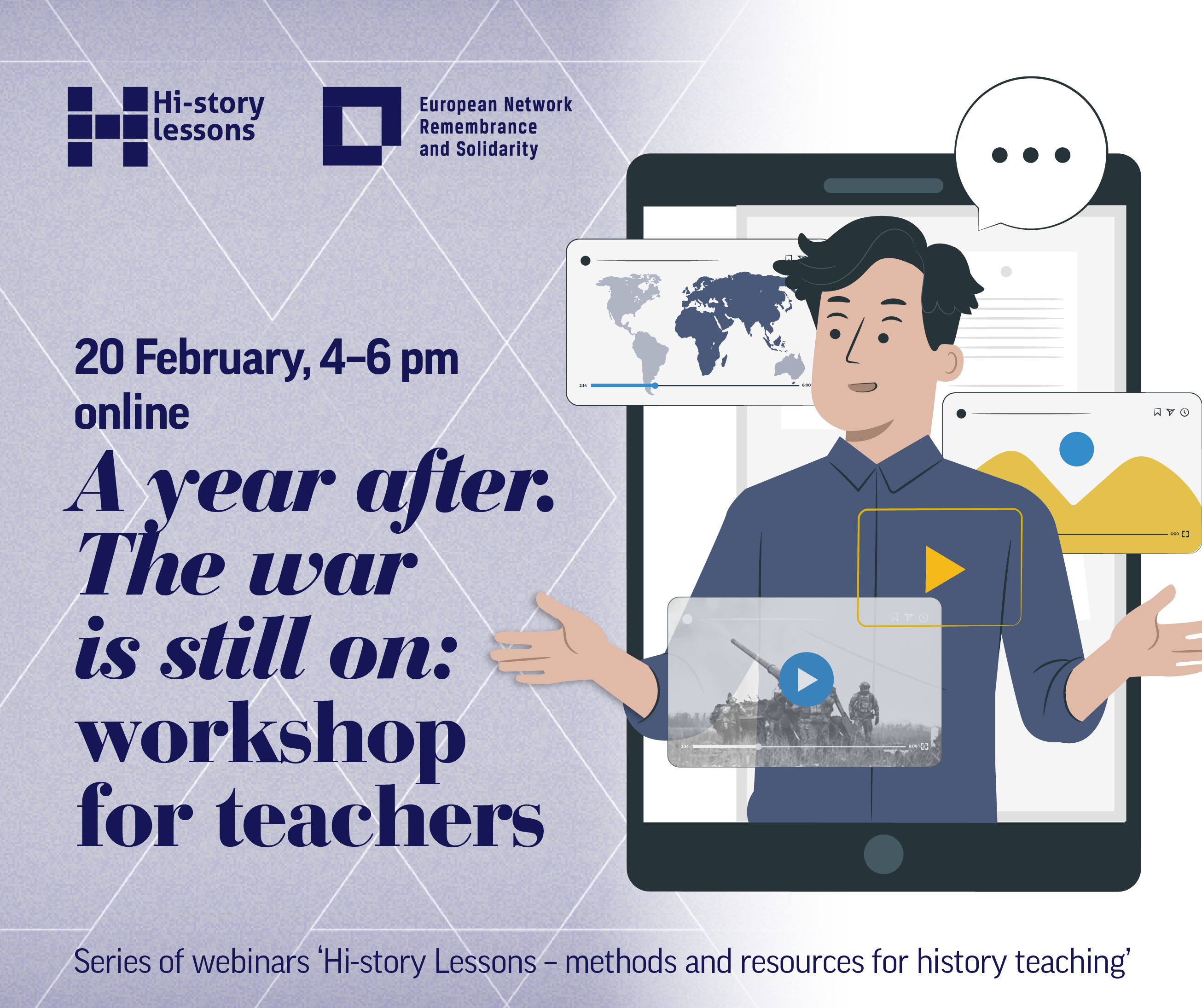On the anniversary of Russia's invasion against Ukraine on 24 February, the ENRS conducted a seminar “A year after. The war is still on: workshop for teachers” as part of the Hi-story Lessons project. The idea behind the seminar was to tackle the difficult task of teaching and educating students about this and other current wars in the world. "With this workshop we want to help students understand the injustices and threats of this contemporary war by combating disinformation and taking a strong stance against the violation of human rights" said Urszula Bijoś, historian and project coordinator at ENRS.
For this purpose, ENRS invited the Ukrainian filmmaker and head of the NGO “Tolerance in you” Tetiana Krukovska and senior teacher and school book author Maja Sturm who shared their experiences with other educators when they discussed the difficult and afflicted topic of contemporary wars with students. In addition, Urszula Bijoś from ENRS presented the educational resources on the topic of disinformation, inter alia available on the Hi-story Lessons platform, which is a multilingual, web-based educational project offering various teaching materials helping to integrate new media into the classroom.
The workshop started with forty minutes group discussions, in which one of the main speakers debated with a smaller group various issues related to the topic of war and the associated challenges for teaching. Amongst others they came to the conclusion that:
- While it is important and necessary to address the war, the ethnic diversity of students nowadays must be taken into account to avoid e.g. stigmatization
- Students might ask questions to which even teachers and educators do not have answers like why a war is happening again in the 21th century or why is peace so fragile
- There is a gap between older and younger generations in terms of their perception of war which results from the lack of communication between them
- Forming small groups in class to discuss the topic makes it easier for students to open up and talk about it
Following the group sessions, the speakers gave their presentations, providing useful resources for engaging with the issue of contemporary wars.
Urszula Bijoś began to present an educational kit about how to avoid disinformation. “We must be aware that we cannot avoid disinformation but we can apply our skills to debunk it.” As Russia currently falsifies historical information to further its warmongering in Ukraine, it is important to teach students how to recognise such fake news. Therefore teachers and educators can use free and ready-to-use materials provided by reliable platforms. Amongst others, the resources presented comprise:
- A guidebook “No to disinformation” by Łukasz Kamiński which contains practical tips as well as reliable websites to help identify disinformation (https://hi-storylessons.eu/wp-content/uploads/2021/04/NO-TO-DISINFORMATION.pdf)
- EU vs. Disinfo website, a database which identifies, compiles, and exposes disinformation cases originating in pro-Kremlin media (https://euvsdisinfo.eu/)
- The IWITNESS platform by the USC Shoah foundation which encompasses testimonies and lesson plans on the topic of war in Ukraine (https://iwitness.usc.edu/sites/warinukraine?at=ag)
Maja Sturm continued to talk about her experiences teaching her class about the war in Ukraine. She suggested an artistic approach to deal with the issue by encouraging students to draw pictures about their perception of war, as everyone is likely to participate.
“Images discussed without mentioning the artist's name give you the opportunity to leave the creator's personal emotionality out of the discussion of the motif for the time being. Thus it is easier for students to open up about the topic and engage in intense dialogues.”
The senior teacher also recommended the book “What is war?” by Eduard Altarriba which tells the reader through clear explanations punctuated by historical and contemporary examples, including the war in Ukraine, what war is and how it can be prevented.
Lastly, Tetiana Krukovska presented the results from two of her organization’s projects where students from multi-ethnic backgrounds dealt with Russia’s war of aggression in Ukraine using art to express their feelings and thoughts. They therefore created two short movies:
- “Never again is again” from the PALIANYTSIA. International School of Activists unites active youth from Ukraine and EU countries (https://www.toleranceinyou.com/palianytcia)
- “International Body Language” from the YOUTOPIA project (https://www.toleranceinyou.com/youtopia)
She furthermore drew attention to the possibility to ask Ukrainians themselves about their personal experience as a lot do want to share them. In addition, Tetiana Krukovska, similar to Maja Sturm, emphasized the advantage of employing pictures to address the topic, though she thereby referred to already existing images. One example is the psycho-educational booklet-series “Trauma Surviving and Hope” available online (https://www.trauma-surviving.com/) in which different forms of trauma are dealt with through comic strips.
Written by Tatjana Smudzinski
